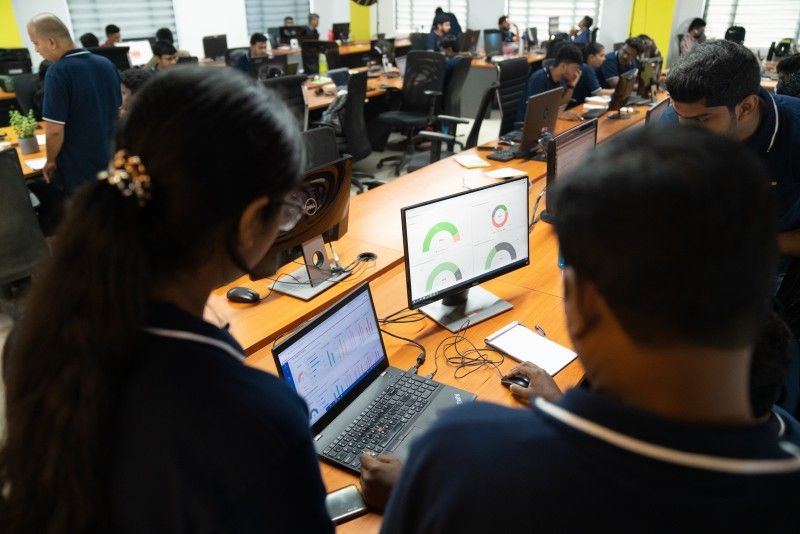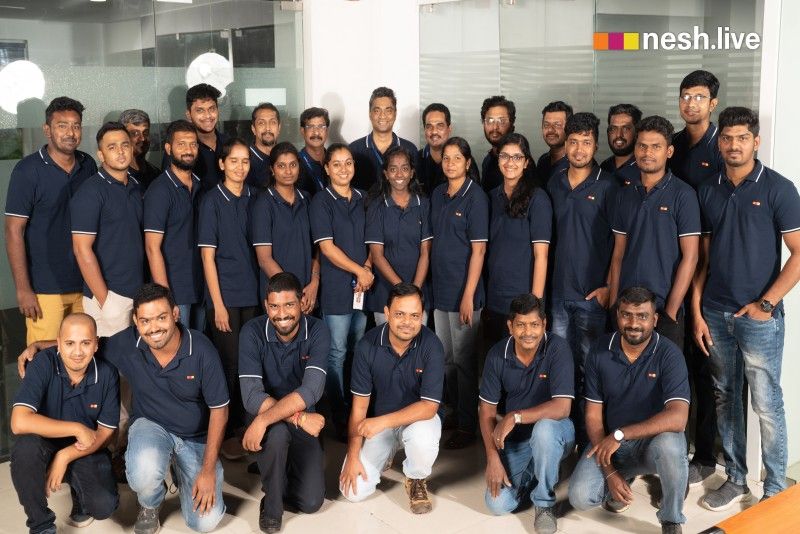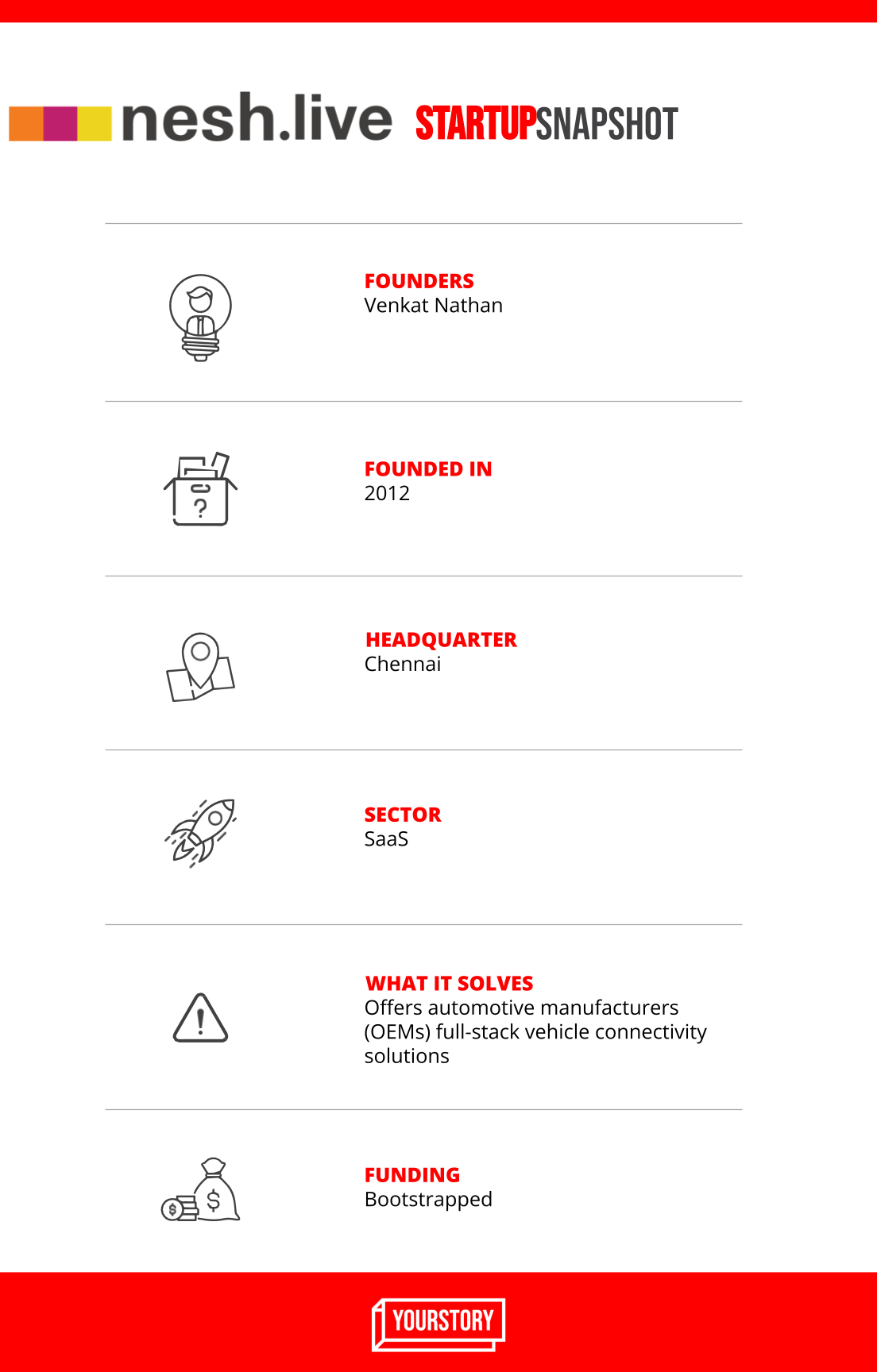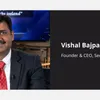Ever since Tesla CEO Elon Musk popularised the vision of driverless vehicles interacting with each other in the future, the idea of connected vehicles has been gaining huge traction from various manufacturers in the automotive sector.
According to Statista, there were 236 million connected cars across the globe, which is forecasted to more than triple to 850+ million by 2035. With the EV push by central and state governments, the demand for vehicle connectivity solutions has seen a considerable rise. Many players around the world are working on solutions, including – registered as Nesh Technologies.
Founded in 2012 by Venkat Nathan, Chennai-based Nesh LIVE offers automotive manufacturers (OEMs) full-stack SaaS solutions for vehicle connectivity.
The startup’s solution allows OEMs to collect and send data to the cloud for further processing for analytics, and reports about engine health and driver behaviour.
“We are in the business of making road transportation safer for everyone by improving local safety and efficiency,” Venkat, Founder and CEO of Nest LIVE, tells YourStory.
“We also aim to improve vehicle safety and efficiency for all vehicles out there – be it trucks, cars or two-wheelers – as improving good transportation is very critical in a country where a lot of mechanisms and regulations are being put in place to reduce the number of accidents,” he adds.

How the product works
The startup installs its software-as-a-service Nesh LIVE on the vehicle at the design stage. The data collected from the vehicle is then transferred to the Nesh LIVE cloud platform.
“We help make vehicles safer and more efficient by collecting a lot of data from various sensory points in the vehicle,” Venkat says.
Using Artificial Intelligence, data stored in the cloud is processed to create insights and decision points that can help manufacturers, owner, service networks, and fleet owners.
“We feed them data points to enable them to not only react to certain situations, but also in some cases, proactively figure out issues and address them before they happen,” tells Venkat
The company works with eight auto manufacturers, including five electric vehicle (EV) manufacturers, and three leading auto and truck manufacturers. The company claims that it has boarded close to 100,000 vehicles in the last 24 months at leading OEMs.
Its product processes close to about 100 million data points every day. It processes three billion data points a month, and has tested its Machine Learning engine algorithm by driving vehicles for miles and collecting 50 billion data points.
Nesh LIVE works with EV manufacturers – right from the vehicle engineering stage to identifying various sensory points needed to extract data. This is done using custom-designed telematics control units (TCU) with edge processing capabilities to predict battery range and state of charge in real-time.
The protocol to transfer data from vehicles to the cloud is also designed for each manufacturer’s specific needs around a multitude of important use cases such as battery discharge characteristics based on time, distance, and other external factors such as road profile and weather condition, tire pressure monitoring, and predictive diagnostics to guide new EV owners to the right driving and charging behaviour.
“These insights not only allow EV manufacturers to launch connected features to end-users but also guide research and development (R&D) decisions around the choice of battery type or selection of body materials to use by measuring their performance with real-time analytics of vehicle data,” explains Venkat.
Some of the insights accessible to users include drivers statistics, best routes to be taken, the status of the vehicle as to what the vehicle condition is, and also a comparison of how the vehicle is efficient with other vehicles.
“We are actually saving a lot of money in terms of some proactive and preventive measures,” he adds.
Evolution of the product
Nesh LIVE has been in the market since 2016. Before exploring vehicle connectivity solutions, the startup was into building mobile applications for the fleet industry.
“We were building applications and solutions to track drivers. But then, the industry was in the early stages about six years ago. Then we realised that most of the solutions that were built for the aftermarket (secondary market),” tells Venkat.
Venkat claims that he chose to build a product for the primary market rather than the secondary market as the quality of data is much better in the former than the latter.
Nesh LIVE also started to address the needs of the service networks and the individual owners.

Team Nesh LIVE
Completely bootstrapped, the startup was selected by Stanford University as one of the promising startups in India under Seed Transformation Programme in 2017.
The startup boasts of a 50-membered team, with nearly 30 of them in the technology team. Before founding Nesh Technologies, Venkat was Vice President - Solutions Delivery at Virtusa, a US-headquartered IT company.
He is joined by Giridhar Joshi as Head of Engineering at Nesh LIVE. Before joining Nesh, he was Vice President of MapMyIndia.
“The tech background helps you to start a wave with the depth of knowledge gained from product company and the breadth gained from helping consulting companies,” says Venkat.
The startup claims that it had a 300 percent growth in revenue for the year FY 2020-21.
While the pandemic adversely impacted various sectors including the automotive segment, Venkat grew his business. He claims this as due to lesser volumes which made it possible to introduce innovation. This, in turn, led to faster adoption among his clients.

Future plans
The startup competes with Spinny-acquired Scouto, Excelforce, and Automovill to name a few. “Most of our competition is in the aftermarket,” says Venkat
Nesh LIVE plans to work with insurance, banking and finance companies in the future and provide them with data to supplement their functions.
“Because we work with OEMs, we are able to provide much more intelligence with the data,” he adds. “The value addition of features and predictive analytics diagnostics are better when they get engaged right at the record manufacturing stage.”
A market study by Global Industry Analysts Inc said that the global market for automotive software estimated at $19.5 billion in 2022, is projected to reach a revised size of $28.9 Billion by 2026, growing at a CAGR of 8.9 percent over the analysis period.
Edited by Kanishk Singh



